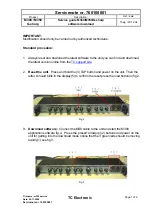
47
Analog Elemental Series
HARMONICS Switch
With the HARMONICS switch you choose the frequency range of the fundamental tone area
that should be processed with the HARMONICS control. There are four available frequency
ranges with respective center frequencies of 9.8 kHz, 6.6 kHz, 2.8 kHz and 1.9 kHz. For reasons
of space, we have rounded frequency values for the values on the front panel. The bandwidths
of the filters are listed under “Specifications, Harmonics Filter” on page 50.
The frequency ranges are based upon our experiences and test series to offer ideal processing
ranges for wide variety of instruments (and vocals of course). You may find further informa-
tion under „Operation/Application Examples” below.
SATURATION Control
As the name implies, the SATURATION control determines the degree of the tube saturation.
At the most extreme level this SATURATION control output level may increase the overall
output level by approximately 6 dB.
The SATURATION control offers a wide range of effects intensity from most subtle to brutal
harmonic distortion. Aside from harmonic tube distortion, the accompanying tube limiting
effect should also be considered. For further details on the saturation effect refer to the
“Introduction” on the previous page.
Signal LED
The SIG. LED indicates that an audio signal reaches the input with a level above -20 dB. This
LED helps the operator especially in complex setups to determine immediately whether the
TwinTube actually receives any signal.
Here we refer to only two significant examples, of course without suggesting completeness.
We would like to simplify starting with the TwinTube by sharing some thoughts and experi-
ences in these applications areas. The effects and results described here can be applied to
many other instruments—nothing should keep you away from using the TwinTube without
restriction.
Vocals
Optimizing vocal tracks is a highlight among the processing applications of the TwinTube.
Often further EQing is not necessary anymore in order to lift a voice from a mix and get it up
front. A recommendation for female voices: HARMONICS switch to 6, HARMONICS control to
about 2 o’clock, SATURATION to about 12 o’clock.
With these settings the described effect should be clearly audible and from here individual
tracks can be optimized. With female voices we suggest trying HARMONICS switch settings 6
and 10 while switching between 2, 3, and 6 with male voices.
Acoustic Guitars
The success in treating e-guitars depends on previous recording and processing gear and
techniques—if tube amps and further effects were already applied, it is hard to foresee how
much the TwinTube can contribute when optimizing or designing a sound.
In contrast to e-guitars, there is a huge potential in processing acoustical guitar tracks.
Picking sounds can be intensified, in general tube saturation and limiting can improve loud-
ness and condenses the sound. Presence is emphasized and the instrument cuts through a
mix much better without raising levels too much. A well chosen amount of harmonic distortion
always adds some roughness which may often be a nice touch in several playing styles.
Bedienelemente
TwinTube | Control Elements
TwinTube | Applications
Summary of Contents for TwinTube
Page 21: ...21 Analog Elemental Series Premium Mic Pre Block Diagram...
Page 27: ...27 Analog Elemental Series Preference Mic Pre Block Diagram...
Page 31: ...31 Analog Elemental Series Dual Band De Esser Block Diagram...
Page 39: ...39 Analog Elemental Series DynaMaxx Block Diagramm...
Page 45: ...45 Analog Elemental Series Transient Designer Block Diagram...
Page 51: ...51 Analog Elemental Series TwinTube Block Diagram...
Page 52: ...Analog Elemental Series English Manual Analog Elemental Series...





































